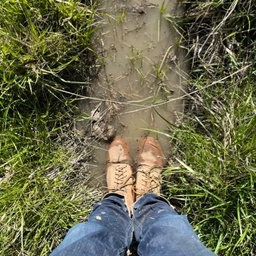
David Marston
Publisher at Writers on the Range
David Marston - Publisher of WOTR. Opinion is our biz. We're climate change worriers, but we also cover public lands, water, wildlife, fire and social justice.
Articles
-
1 week ago |
writersontherange.org | David Marston
Each of us Americans conducts our daily life in bubbles, all shockingly siloed from each other. These days, we don’t share much common ground between our circumscribed worlds based on culture, zip code, religion, and political beliefs. We feel empathy toward others inside our comfortable corrals. But too often, mutual support doesn’t reach outward. Mistrust replaces compassion. I spent late April in my conservationist bubble.
-
2 weeks ago |
writersontherange.org | David Marston
Barred owls, with their vivid brown stripes, are acting like bullies of the forest in the Northwest, driving their smaller cousins, the northern spotted owl, to the brink of extinction. Once barred owls start colonizing old-growth forests, rare spotted owls no longer have a home. The survival of spotted owls meant a lot to me as a young environmental activist. In 1985, I spent days living on a plywood platform perched high in the canopy of an Oregon Douglas fir.
-
2 weeks ago |
writersontherange.org | David Marston
You probably don’t see wildland firefighters on the job because they usually work in remote areas. But with wildfires moving from the backcountry to backyards, the public is becoming more aware of the men and women who do this dangerous work. At the same time, people probably don’t know much about the very real health risks of the job. Now, it’s getting harder for anyone to know.
-
1 month ago |
writersontherange.org | David Marston
I live in Jackson County, in northern Colorado, where hundreds of inactive and abandoned oil wells litter the landscape. Not only are they an ugly sight, they are also just a few of the estimated 2.6 million unplugged wells across the country that leak methane, benzene and other toxic substances. The reality is that long after I’m gone, most or all of those wells will remain unplugged.
-
1 month ago |
writersontherange.org | David Marston
Corn ethanol, also known as grain alcohol, has been burned in gasoline engines and human stomachs since before Henry Ford was born. It’s hard on both, so until 35 years ago it never caught on much, at least not for engines. But in 1990, Congress amended the Clean Air Act, requiring gasoline to be spiked with an oxygen-containing compound to reduce carbon monoxide. With the help of corn-belt farmers and public officials, the oxygenate of choice became corn-based ethanol.
Try JournoFinder For Free
Search and contact over 1M+ journalist profiles, browse 100M+ articles, and unlock powerful PR tools.
Start Your 7-Day Free Trial →X (formerly Twitter)
- Followers
- 587
- Tweets
- 860
- DMs Open
- No